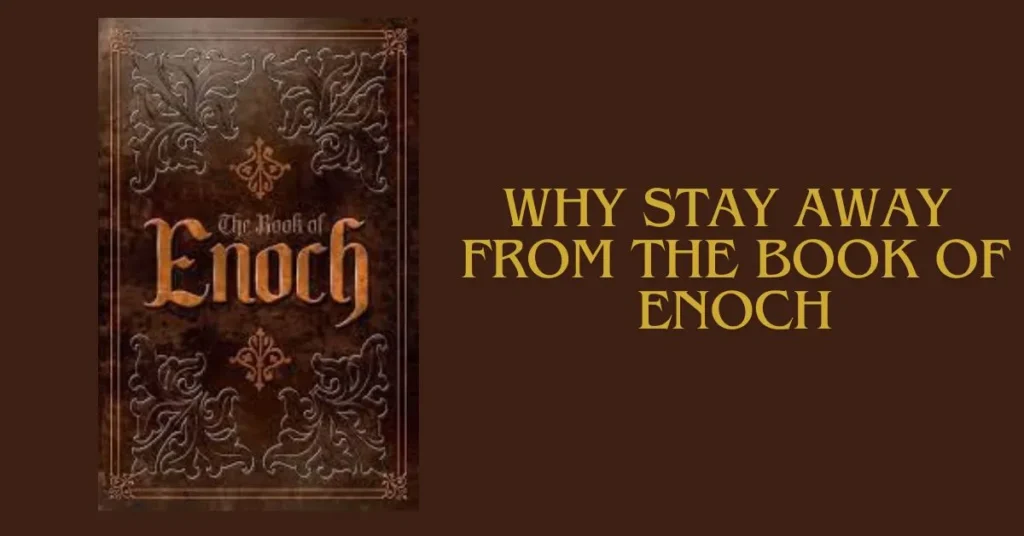In the vast expanse of religious literature, the Book of Enoch stands as a mysterious and controversial text, captivating the curiosity of many seekers of spiritual knowledge. However, despite its allure, there are compelling reasons to exercise caution and steer clear of this enigmatic book. Let’s delve into why staying away from the Book of Enoch might be the wisest decision.
The Murky Origins and Questionable Authenticity:
One of the primary reasons to approach the Book of Enoch with skepticism is its murky origins and questionable authenticity. Unlike canonical scriptures with well-documented authorship and historical context, the origins of the Book of Enoch are shrouded in uncertainty. While it claims to be authored by the biblical figure Enoch, great-grandfather of Noah, scholars widely debate its authorship and dating, suggesting that it was likely composed by multiple authors over centuries.
This lack of clarity raises doubts about the book’s authenticity and reliability as a source of spiritual guidance. Without a clear understanding of its origins, readers are left to question the motives and intentions behind its composition. As such, it’s essential to approach the Book of Enoch with a critical mind and a discerning spirit, recognizing that its historical accuracy and theological significance may be dubious at best.
Divergence from Canonical Scriptures:
Another reason to tread carefully around the Book of Enoch is its divergence from canonical scriptures accepted by mainstream religious traditions. While some may view it as a supplementary text offering insights into biblical narratives and theology, others caution that it introduces inconsistencies and contradictions that undermine the integrity of the faith.
For example, the Book of Enoch contains elaborate accounts of angelic beings, cosmological realms, and apocalyptic visions that are absent from the Bible. These embellishments and expansions on biblical narratives can lead to confusion and misunderstanding, particularly among those less familiar with biblical scholarship. Furthermore, the theological implications of these deviations from canonical texts can be profound, potentially leading readers astray from orthodox beliefs.
Potential for Misinterpretation and Misuse:
Beyond its questionable origins and theological inconsistencies, the Book of Enoch also carries the risk of being misinterpreted and misused by individuals and groups with ulterior motives. Throughout history, various sects and movements have seized upon its esoteric teachings to justify their beliefs and practices, often with divisive and harmful consequences.
From apocalyptic sects predicting the end of the world to fringe groups promoting unorthodox doctrines, the Book of Enoch has been wielded as a tool to advance diverse agendas. This potential for misuse underscores the importance of exercising caution when engaging with the text and being vigilant against interpretations that veer into dangerous territory.
Lack of Canonical Endorsement:
Perhaps the most significant reason to distance oneself from the Book of Enoch is its exclusion from the canon of scriptures recognized by mainstream religious traditions. Unlike the books of the Bible, which have undergone rigorous scrutiny and discernment by religious authorities, the Book of Enoch has not received widespread endorsement as a sacred text.
This lack of canonical endorsement raises serious questions about its status and authority within religious communities. While some may argue that the book contains valuable insights and teachings, its exclusion from the canon raises doubts about its reliability and relevance for guiding faith and practice. As such, readers should approach the Book of Enoch with caution and prioritize the study of canonical scriptures that have been universally recognized and affirmed by religious authorities.
Conclusion: Proceed with Caution
While the Book of Enoch may hold intrigue for those fascinated by ancient texts and esoteric wisdom, there are compelling reasons to exercise caution and stay away from its teachings. From its murky origins and theological inconsistencies to the potential for misinterpretation and lack of canonical endorsement, the Book of Enoch presents numerous challenges for those seeking spiritual truth and guidance.
Instead of being drawn in by its mystique, individuals would be wise to prioritize the study of canonical scriptures recognized by mainstream religious traditions. By doing so, they can ensure a solid foundation for their faith and avoid the pitfalls of wandering into uncertain and potentially hazardous theological territory. In the quest for spiritual enlightenment, it’s essential to tread carefully and discerningly, lest we be led astray by the allure of the unknown.







